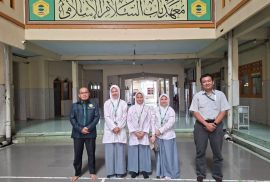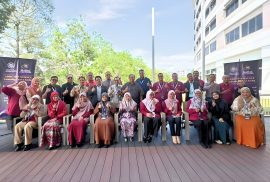The Faculty of Psychology, Universitas Gadjah Mada (UGM), in collaboration with the Center for Education Standards and Policy (PSKP) of the Ministry of Primary and Secondary Education (Kemendikdasmen), conducted monitoring and evaluation (Monev) of the 2025 Academic Ability Test (TKA) implementation across six regions: Maluku, Special Region of Yogyakarta, West Sumatra, Gorontalo, East Kalimantan, and Banten. The Monev aims to ensure TKA implementation complies with national standards while gathering input for the improvement of academic ability-based selection policies.
SDG 17: Partnerships for the Goals
Prof. Drs. Subandi, M.A., Ph.D., Psikolog, a lecturer at the Faculty of Psychology, Universitas Gadjah Mada (UGM), was invited to serve as both facilitator and speaker at the Psychospirituality and Recovery of Substance Use Disorders Workshop, organized by the Malaysian Association of Drug Addiction Counselors (MADAC) in collaboration with Universitas Gadjah Mada (UGM). This event was held from 26–29 October 2025 at the Royal Park Hotel @UNITEN, Bangi, Malaysia.
Mental health promotion across generations has become increasingly crucial in today’s rapidly changing world, especially for young people navigating complex family, educational, and digital environments. Responding to this global need, the Center for Public Mental Health (CPMH), led by Dr. Diana Setiyawati, M.HSc., Psikolog., in collaboration with the Center for Life-Span Development (CLSD), headed by Aisha Sekar Laziardi Rachmanie, M.Psi., Psikolog., – both under the Faculty of Psychology, Universitas Gadjah Mada (UGM), proudly held the International Course on Public Mental Health (ICPMH) 2025 with the theme “Bridging Generations: Thriving Youth, Supportive Families, Collaborative Schools”. This programme aimed to explore strategies for strengthening youth well-being through supportive family relationships, collaborative school engagement, and active community involvement.
Non-Suicidal Self-Injury (NSSI), or self-harming behavior without suicidal intent, is increasingly observed, particularly among adolescents and young adults. In Indonesia, several studies indicate that this phenomenon appears in everyday settings, influenced by emotional pressure, unsupportive social relationships, and the growing complexity of life challenges. A research team from the Faculty of Psychology, Universitas Gadjah Mada (UGM) is developing a psychoeducational module on NSSI designed as a first step to understand this behavior, reduce stigma, and help individuals and their immediate circles respond more appropriately. This initiative is funded by the 2025 Research Grant of the Faculty of Psychology UGM.
UGM Psychology Team Holds Collaborative Parenting Workshop with LAKI to Strengthen Family Resilience
A team from the Faculty of Psychology UGM, in collaboration with the Indonesian Family Advocacy Institute (LAKI), is delivering a collaborative parenting education program in the form of an interactive workshop to strengthen family resilience. The initiative emphasizes caregiving that aligns with children’s emotional needs and developmental stages, while equipping parents with practical, easy-to-apply parenting principles. This program is funded by the 2025 Community Service Grant (Hibah PkM) of the Faculty of Psychology UGM.
The Faculty of Psychology UGM, through the Center for Life-Span Development (CLSD), in collaboration with RSUP Dr. Sardjito, has initiated a community engagement program that focuses on strengthening parents’ capacity to support children with Autism Spectrum Disorder (ASD). The program develops an educational toolkit titled “Parental Support Toolkit: Understanding Autism Spectrum Disorder in Children and Adolescents” designed to be accessible, practical, and evidence-based. By emphasizing parental attunement—the ability of parents to understand and respond sensitively and synchronously to their child’s signals—the program aims to help families stimulate children’s social skills in everyday contexts.
The Center of Life-Span Development (CLSD), Faculty of Psychology UGM, is developing environmental-themed storybooks for early childhood as a community empowerment initiative to strengthen literacy and foster eco-friendly habits from an early age. The program builds on insights from The Reading Buddies (TRB) initiative, which shows that children aged 4–6 are highly responsive to interactive stories, yet access to reading materials specifically addressing waste management and environmental themes remains limited.
Lentera Senja, short for Lansia Energik Sejahtera Sehat Sentosa Jiwa dan Raga (Energetic, Prosperous, Healthy, and Peaceful Older Adults in Body and Mind), is an initiative by the Center for Life-Span Development (CLSD) at the Faculty of Psychology, Universitas Gadjah Mada (UGM) that develops a support toolkit to help older adults enhance their understanding of psychological well-being. The program stems from Indonesia’s demographic reality: according to Statistics Indonesia (2023), the proportion of older adults has reached 11.56% and is projected to rise to 20% by 2045. Alongside increasing life expectancy, older adults face complex challenges such as declining physical and cognitive functioning, shrinking social networks, and heightened risks of loneliness, depression, and anxiety. Existing services have tended to prioritize physical health, while psychological, social, and educational dimensions remain insufficiently integrated. This gap motivated the CLSD team to design a structured, user-friendly, evidence-informed toolkit that provides clear guidance for facilitators to strengthen older adults’ understanding of psychological well-being.
A research team from the Center for Life-Span Development (CLSD), Faculty of Psychology, Universitas Gadjah Mada (UGM), is initiating a qualitative study to understand how Indonesian adolescents define mental health, the challenges they face, and the protective and risk factors that shape their psychological well-being. National data indicate that 34.9% of adolescents experienced mental health problems in the past 12 months, yet only 2.6% have accessed services. In response, this study seeks to foreground adolescents’ own voices to ensure that resulting interventions genuinely align with their lived experiences. This research is funded by the 2025 UGM Faculty of Psychology Research Grant.
The Faculty of Psychology, Universitas Gadjah Mada, through the Mental, Neural, and Behavior expertise group, is organizing a community empowerment program in the form of training on brain imaging analysis using Magnetic Resonance Imaging (MRI) for students. This initiative is designed to bridge the growing need for neuroimaging competencies in modern psychological research while expanding interdisciplinary collaboration, particularly with medicine and radiology.




